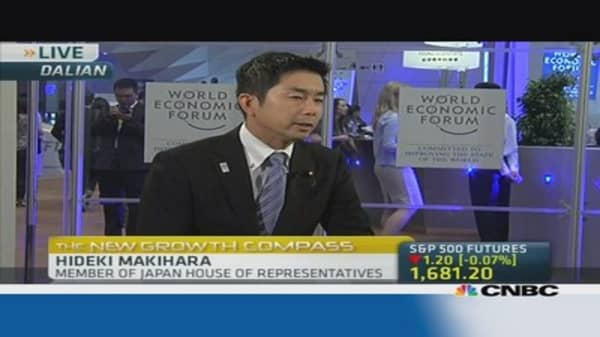Controversial plans to raise Japan's consumption tax may be edging closer to fruition, but some doubts persist, with one key lawmaker noting it could damage the economy.
"Economically speaking, maybe the consumption tax is not good for us," Hideki Makihara, a member of Japan's House of Representatives in charge of the ruling Liberal Democratic Party's corporate taxation policy, told CNBC Wednesday on the side-lines of the World Economic Forum in Dalian, China.
(Read more:Sales tax hike is vital and will hurt Japan, says IMF)
Currently, the plan is for the consumption tax to rise to 8 percent in April from the present 5 percent, followed by a further hike to 10 percent by October 2015.
The Japanese government has been mulling whether to press ahead with the rise and Prime Minister Shinzo Abe is due make a decision early next month.
Abe is walking a tightrope between concerns the tax may dent Japan's nascent economic recovery and a need to take steps to alleviate the country's huge debt load.
(Read more:Hiking Japan's sales tax: why it's now or never)
Makihara noted that ministers were told Tuesday to develop new policies to prevent the tax from damaging the economy.
"We will introduce some corporate tax reduction. That's [for] sure. Under yesterday's instruction, we will think about some new economic stimulus by reducing the tax for the individuals," Makihara added.
Abe told his government on Tuesday to draft measures to buffer the economy from the impact of a sales-tax increase. Abe did not specify the size of the stimulus but previous comments from Economy Minister Akira Amari suggest any stimulus could be in the region of 2 trillion yen (around $20 billion) or more, Reuters reported.
(Read more: Is consumption tax hike the 'wrong policy' for Japan?)
Financial markets have given Japan the benefit of doubt about its ability to continue to shoulder a massive debt load, but any wavering from Tokyo over commitments to reform could spur an exodus of funds from the country's markets, analysts say.
—By CNBC.Com's Leslie Shaffer; Follow her on Twitter @LeslieShaffer1




